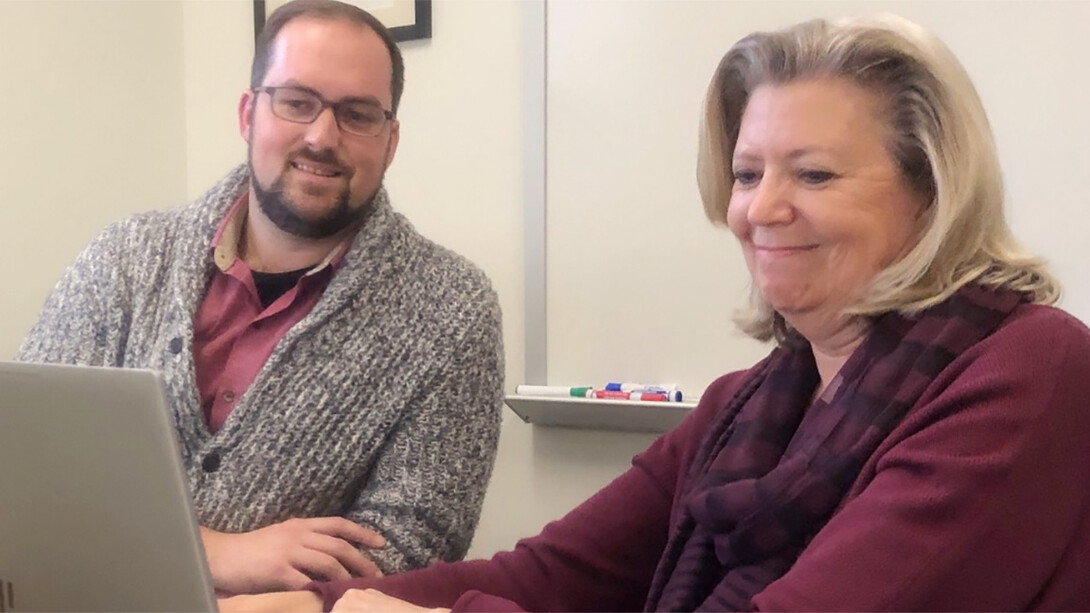
It was an early career pivot that led Steven Cain to the Center for Transformative Teaching.
As an undergraduate, Cain pursued broadcast journalism, but nearing graduation, he realized his interests and talents might be suited to something different.
“I was still interested in working in technology and communication, and decided to pursue a teaching certificate at the time,” Cain said. “Going into my master’s program, I was actually thinking about being a secondary math teacher. I ended up having a conversation with one of the instructional designers that was helping with a course I was taking, and I learned a little bit about this profession.
“I didn’t know that this was a profession, and learning about it, I was really interested because it touched on these larges spaces of technology, communication and education.”
Cain, a senior instructional designer with the center, is among those being honored at the University of Nebraska–Lincoln’s Celebration of Service Sept. 28. He is marking his 10th year at the university, but he’s also an alumnus, having received both his bachelor’s and master’s degrees here.
Cain worked for the university as instructor in the College of Journalism and Mass Communications, and provided technical support. He also spent some time in the newspaper world as a page designer for Lee Enterprises. He joined the Center for Transformative Teaching, then known as online and distant education, in 2016 as an instructional design technology specialist. It became the CTT in 2019.
“We’ve gone through some changes the last few years to supporting all modes of courses — online, blended and face to face,” Cain said. “It really spans the gamut now. Any development that an instructor might be looking to do with their teaching, we’re here to help with that.”
Cain spends most of his time in one-on-one consultations with instructors in the College of Business and the College of Agricultural Sciences and Natural Resources, where he is embedded, helping instructors consider what’s working well and what could be improved in the classroom.
“Having that sounding board to talk about different strategies that are available, what strategies you’re using and how students are receiving those can be super valuable,” Cain said.
He has also helped develop a variety of resources and professional development opportunities for instructors across campus.
“Myself and Brian Wilson facilitated a Reflective Practitioner Program over the last year and a half, and Eric French and I developed the Aspirational Teaching Institute, which is a program we offered in the spring focused on fostering student success in high-enrollment gateway courses. I’m currently working with another colleague, Amy Ort, on another institute focused on inclusive teaching practices,” he said.
As part of the CTT team, Cain was instrumental in the move to remote learning when the university shut down in-person classes at the start of the COVID-19 pandemic. For example, prior to the pandemic, the center had offered the Institute for Online Teaching for more than 20 years and averaged 20-30 participants in each course. In the spring of 2020, Cain and colleagues offered the program four times and had a combined enrollment of more than 700 instructors.
“It was just a completely different landscape,” Cain said. “We all had to take on entirely different teaching environments, thinking about what it means to engage students in these new ways, what limitations are in place, and what resources are available to us. We had to move as quickly as we could.”
Despite the immense challenges and rapid change of the last two years, Cain still relishes the continued opportunities his career affords him.
“My favorite part is working with instructors on brand new courses,” he said. “There are so many possibilities. We can really set the stage to help instructors think about forging valuable relationships with students and making sure students are being given the opportunities to engage with the classroom experience in meaningful ways.
“Being able to have those types of discussions with instructors, framing the teaching experience as something that’s really exciting and worth cherishing, and striving to create an environment that is safe and nurturing and developmental is all really fun to me.”







